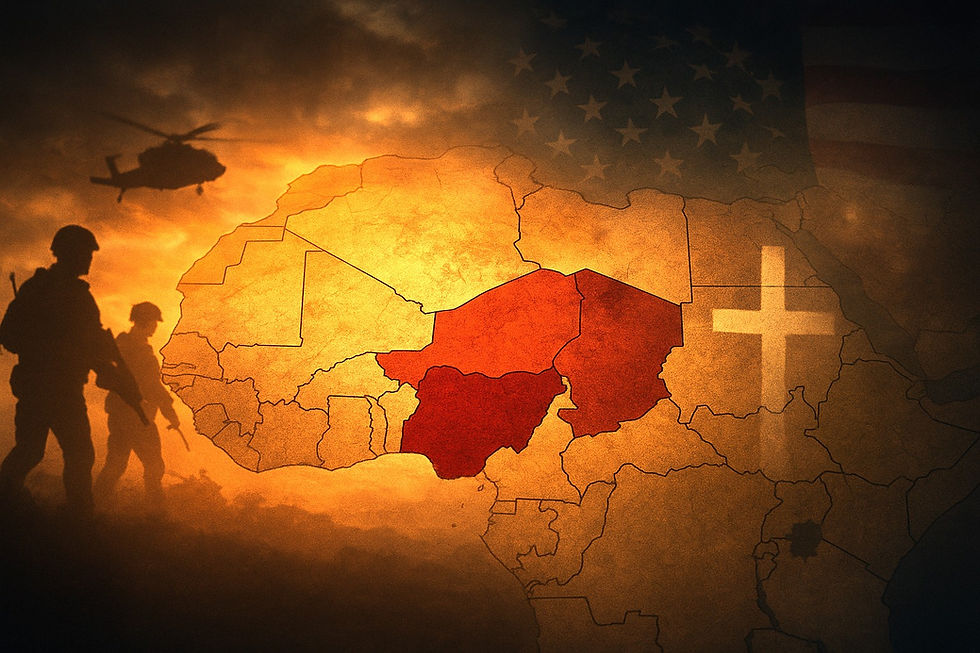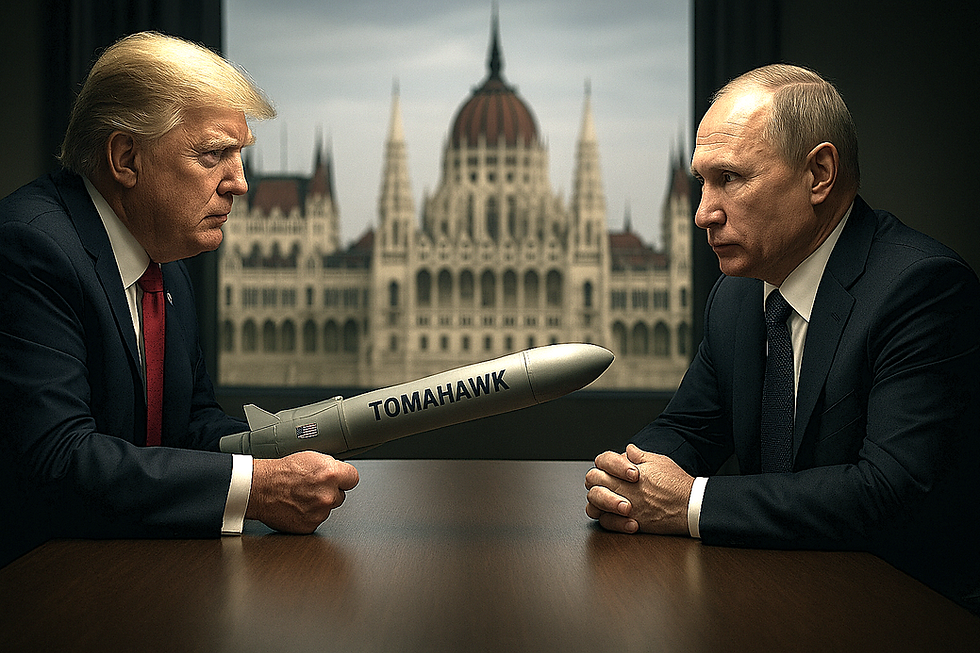Is Trump Preparing for a Military Intervention in Nigeria?
- Teo Drinkovic
- Nov 3, 2025
- 4 min read
Why the Sudden Trump Interest in Nigeria, and Why the U.S. Election Cycle, African Geopolitics, and the Crisis of Religious Violence Are Colliding Right Now

Introduction
U.S. President Donald Trump recently made a sharply worded statement and instructed the Pentagon to begin planning for a possible military intervention in Nigeria, claiming that the West African nation has failed to protect its Christian communities from attacks by Islamist militant groups. According to statements circulating on social media and reports picked up by global media outlets, Trump also announced a potential suspension of U.S. aid, pointing to what he called an “existential threat” to Christians in Nigeria. bbc.com
Predictably, the reaction in Abuja was far from positive. The Nigerian government quickly rejected Trump’s accusations, denying that the state tolerates religious violence and calling for respect for national sovereignty. President Bola Ahmed Tinubu and other senior officials emphasized that Nigeria is a partner in counterterrorism efforts and is actively working to protect all citizens, regardless of faith.
At the same time, Nigerian officials warned that unilateral foreign military interventions often worsen security crises rather than resolve them. They noted the risk of escalating violence, civilian casualties, mass displacement, rising anti-American sentiment, and the strengthening of militant networks.
So why Nigeria, and why now? Let's break down the situation.
The Situation in Nigeria
The situation in Nigeria is extremely complex. The country is dealing with multiple overlapping conflicts, each driven by different political, religious, ethnic, and economic tensions. Together, they create an environment of chronic insecurity.
Boko Haram
First, in the northeast, Boko Haram and a breakaway faction known as ISWAP (Islamic State West Africa Province) have waged a years-long insurgency, targeting villages, army positions, and civilian convoys. Wikipedia
Both Muslims and Christians are victims of these attacks, although some assaults specifically target communities identified by religion or ethnicity.
In recent years, ISWAP has become more strategically sophisticated, executing coordinated assaults on military bases and securing sources of funding and weapons. Their operations deepen the conflict, drawing in the military and local defense groups, and creating cycles of retaliation.
Boko Haram in Nigeria, Africa

Conflict between herders and farmers
Meanwhile, in the country’s central region, often referred to as the Middle Belt, conflict between herders and farmers has escalated into deadly violence. Fulani herders, or armed groups associated with them, are often accused of attacking farming communities, many of which are predominantly Christian.
While religion becomes the visible dividing line, the core causes lie in land access, resource depletion, and climate pressure. Still, the result is the same: burned villages, mass displacement, and horrifying scenes of violence against civilians.
Gangs and separatists
Moving northwest, heavily armed criminal gangs kidnap for ransom, raid towns, hijack transport routes, and leave civilian casualties behind. In the south, separatist tensions and local militant groups add yet another layer of instability, further complicating any unified national response.
In short, Nigeria is not facing one singular Islamic militant enemy. It is facing a volatile mixture of terrorist organizations, armed herders, criminal gangs, separatist militias, and local power struggles, many of which become coded and interpreted through religious identity.
And yes, Christian communities have suffered mass killings, forced displacement, and targeted attacks, but they are not the only victims. Civilians across all faiths are caught in the crossfire.
Boko Haram in Nigeria, Africa

Why Nigeria, and Why Now?
Nigeria is Africa’s most populous country, with more than 220 million people, the continent’s largest economy, vast energy reserves, and enormous regional influence. Whoever shapes Nigerian policy shapes the geopolitical trajectory of West and Central Africa.
Nigeria is central in the fight against extremist groups linked to ISIS, Al-Qaeda, and their affiliates. Instability there has a domino effect across multiple neighboring states.
So why is Trump elevating this issue at this moment?
Trump has always relied heavily on support from evangelical and conservative Christian voters. These voters are highly sensitive to global narratives of “Christian persecution.” When news of attacks on churches or Christian villages spreads, they expect a forceful moral and political response.
When Trump said, “We are not going to look the other way anymore,” he was speaking to American Christian voters just as much as he was addressing foreign policy. This isn’t only about Nigeria; it is a symbolic gesture of guardianship over a global Christian identity. He is sending a message:
“I will protect you, not just here, but anywhere in the world.”
At the same time, Africa is undergoing a major shift in global influence. Russia is expanding its footprint throughout the Sahel through Wagner/AFRICORPS military networks in Mali, Burkina Faso, Niger, and parts of Sudan. China is investing heavily in infrastructure and long-term resource partnerships.
The U.S., meanwhile, risks losing strategic access to bases, intelligence networks, and regional leverage. If Washington loses influence in Nigeria, it weakens its position across all of West Africa.
The “protection of Christians” narrative thus serves a dual purpose: humanitarian justification on the surface, geopolitical positioning in practice.
There’s also a practical element: escalating violence in Nigeria has exposed gaps in state response. In several documented cases, authorities arrived hours or days after attacks, or not at all. From the outside, this creates the perception that Nigeria is failing to protect its citizens.
Trump is using this perception as his moral rationale:
“If you won’t protect them, we will.”
So why now?
Because the political timing, media narrative, and global power competition align perfectly. This is a moment in which strong, dramatic rhetoric yields political, emotional, and strategic gain.
This does not necessarily mean U.S. troops are preparing to land in Nigeria tomorrow. Statements like these often serve as pressure tactics, diplomatic signaling, or narrative framing.
Nigeria is too important to be ignored.
Too unstable to be left alone.
Too symbolically charged to be avoided in U.S. election politics.
Trump is acting now because the moment benefits him politically, morally, and strategically, while the true risks remain deferred.







Feel free to comment!